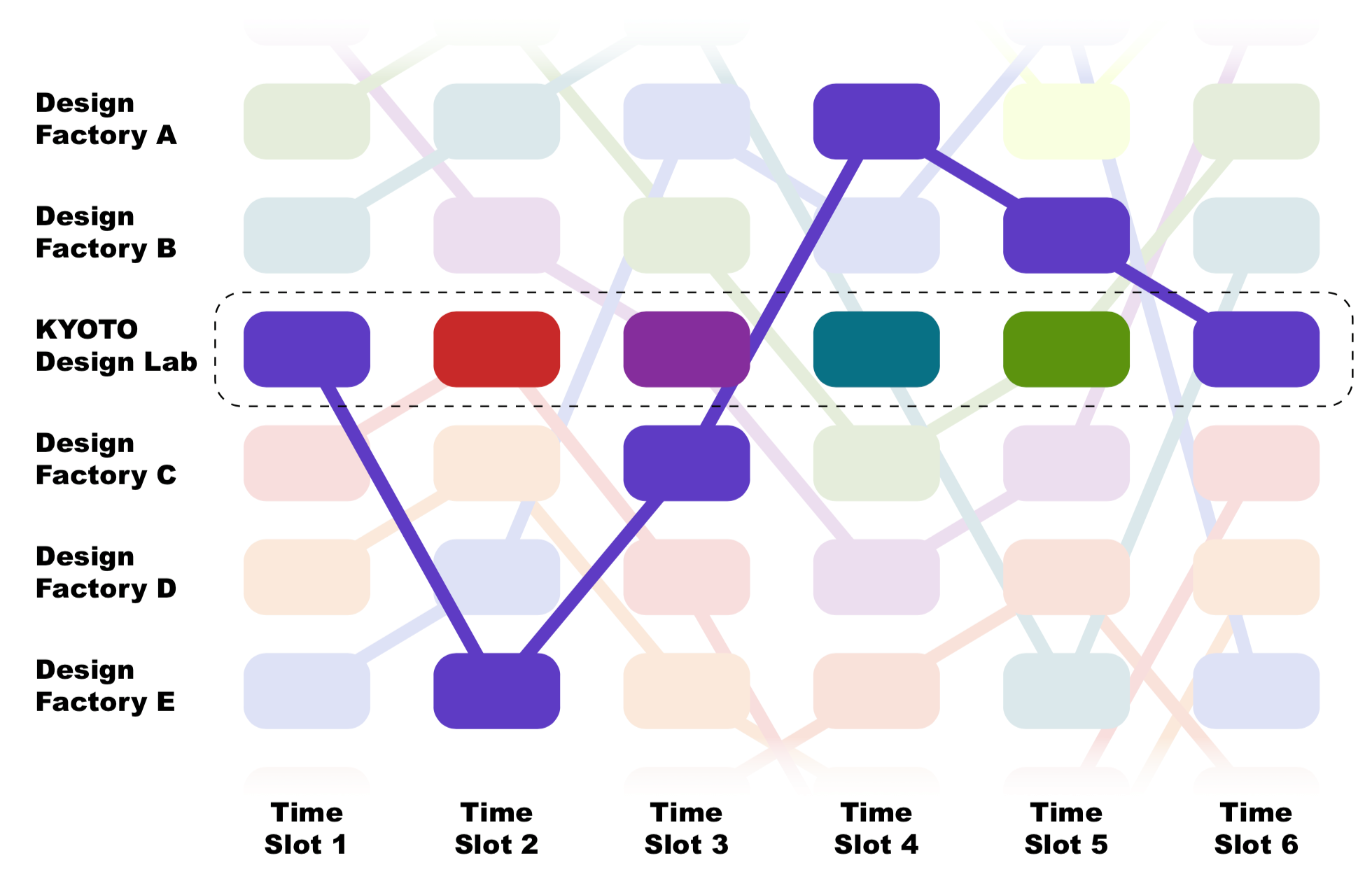アールト大学を起点に20組織以上が参加する国際的なイノベーションハブ、デザインファクトリーグローバルネットワーク(以下、DFGN)に、KYOTO Design Lab [D-lab]は2017年から加盟しています。2018年11月20日から24日までの4日間、DFGN加盟組織間で協働する、デザイン思考をベースにした製品開発ハッカソン「ラットリレー」が開催されました。
ラットリレーの特徴は、開発プロセスを6つの段階に分割し、複数の組織が情報をリレー形式でつなぎ、提案・製品を完成させることにあります。2018年度は、世界13か国のDFGNに加盟する各大学の学生らがプロジェクトに参加しました。筆者(津吹)は、スシ・スズキ特任准教授とともに、世界各国のデザインファクトリーとの連携、および、参加者へのコーチング、アドバイス、活動のサポートを担当しました。
DFGNは「情熱を持って問題解決に取り組み、学習と研究の世界に変化をもたらすこと」をミッションとして掲げており、ラットリレーも時差や文化といった組織の境界をまたいで効率的な連携によっておこなわれています。ラットリレーは各組織が1つのプロジェクトを管轄し、6つのSlot〈問題提起・アイデア・プロトタイプ・テスト・調整・ラップアップ〉から、問題提起とラップアップを除いた4つのSlotを各国の組織がリレー形式で担当します。

How projects transition in the Design Factory Global Network
D-labは、Kyoto Makers Garage (以下、KMG https://www.kyotomakersgarage.com/) をクライアントに迎え、「学生がメイカースペースをより活用するためのアイデアの提案」をミッションとして、Slot1をスタートしました。京都工芸繊維大学の学生(日本人学生・海外留学生)と京都市内在住の社会人で構成された参加者は、施設スタッフや利用者らへのインタビューを実施し、「認知度の向上」を目標に設定しました。

KMGでのヒアリングの結果をもとに課題をまとめる参加者ら
その後、D-labの参加者は、フィンランド(Slot2:アイデア)→ラトビア(Slot3:プロトタイプ)→エストニア(Slot4:テスト)→チリ(Slot5:調整)と、各国が主幹するプロジェクトをリレー形式で受け取りながら進捗させました。各段階で、各国の文化に根ざしすぎた課題や提案、あるいは、ありきたりなジャストアイデアを受け取ることもあり、参加者は発展の仕方に悩んでいる場面がありましたが、文化や言語の壁を感じながらも、自チーム内でディスカッションを繰り返して新たなアイデアを作り出す難しさと楽しさを感じていたようです。
Slot6のラップアップでは、再びD-labチームの学生がKMGを訪れ、同様に各国で展開された内容をもとに最終プレゼンテーションを英語で実施しました。KMGとD-labが協業し、京都工芸繊維大学を中心としたデザイン・ものづくりに興味のある学生が社会人や起業家と出会う場を創出する提案をおこないました。

提案のひとつとして、2拠点を移動しながらでおこなう起業系ワークショップなどがまとめられた
KMG代表の牧野成将社長からは、短期間でまとめ上げた提案へのポジティブな評価のコメントとともに、プレゼンテーションをおこなった学生を中心に今後の産学連携イベントの実施をサポートしてもらえるような依頼をいただきました。参加者はラットリレーを通じて、「国やその文化によってテーマへの解決方法やアイデアが異なり、それを引き継いでまとめ上げることが難しく、また学びにもなった」、「京都にいてまだまだ知らない場所やスタートアップの起業家と交流を持てる場所があることに興味を持った」など、国際的なコラボレーションやスタートアップの世界の醍醐味を感じられたようです。
ラットリレーは来年度もD-labにて実施予定です。今回、参加者の大半はデザイン系学生でしたが、他領域の学生や社会人からの参加も広く募る予定です。D-labウェブサイトで公募をかけますので、多様なメンバーが集まることを期待しています。
─
─
─
ライター紹介津吹達也
京都工芸繊維大学 非常勤講師(2014年~2017年まで特任准教授)。電機メーカーアジア海外営業、IT企業のマーケティング職を経て現職。2014年より京都工芸繊維大学にて、COC連携事業(地域連携)とTechLeader(リーダーシップ開発)事業を担当。
担当科目:リーダーシップ実践Ⅰ・Ⅱ・Kyoto Startup Summer School等
From November 20th to 24th 2018, the KYOTO Design Lab cohosted the global product development hackathon “Rat Relay” organized by the Design Factory Global Network (DFGN https://dfgn.org/). The DFGN is a network of innovation hubs at universities and research institutes in five continents around the world with the mission to create change in the world of learning and research through passion-based culture and effective problem solving.
During the hackathon, the product development process based on design thinking was split up into six, six-hour slots: Empathize and Redefine, Ideate, Prototype, Test, Iterate, and Wrap up. After each slot was completed by an institution in the DFGN, the content was packaged and delivered to another institution to develop further, hence the relay format. Students form institutions in 13 different countries participated in this most recent rat relay, and each institution brought one challenge to be tackled from a sponsoring organization. The host institution was responsible for kicking off and wrapping up the project while four other institutions worked on the intermediate slots.

How projects transition in the Design Factory Global Network
Kyoto Makers Garage (KMG https://www.kyotomakersgarage.com/) sponsored the projects hosted by the KYOTO Design Lab and the challenge was “how to make maker spaces more attractive to students in Kyoto.” Slot I began with the participants at the KYOTO Design Lab visiting the KMG and interviewing the staff and users. The participants included not only students from the Kyoto Institute of Technology but also local community members in Kyoto.

Participants organizing information gathered during the interviews at KMG
For slots II through V, the D-Lab worked on projects that began in Finland (Slot II: Ideate), Latvia (Slot III: Prototype), Estonia (Slot IV: Test), and Chile (Slot V: Iterate). Each slot had their challenges such as language barriers or dealing with a cultural context that’s entirely different, but the participants prevailed through collaboration and iteration.
At the end of Slot VI, the participants at the D-Lab again visited KMG to present the result of the 36 hours of hard work. The final proposal hinged around creating a place where students interested in design and manufacturing can meet entrepreneurs and others with the professional world.

One of the proposals from the final presentation, a workshop that is hosted in different locations
President Makino from KMG gave positive feedback on how quickly such concepts were developed requested the participants to support further collaboration between industry and academia. The participants commented that “the themes and problem solving approach differs greatly from country to country and building on top of that was challenging as well as eye opening.” Furthermore, they were delighted to learn about KMG through the project, that there is a place where they can connect with startups and entrepreneurs.
Rat Relay will return to the KYOTO Design Lab in 2019. If you’re interested in participating, please follow our website so that you’ll be notified when applications will open next.
─
─
─
Author Profile
Tatsuya Tsubuki
Part-time lecturer at the Kyoto Institute of Technology (Associate Professor from 2014 to 2017)
Worked in Asian overseas sales in the electronics industry, and marketing for an IT company.
Since 2014, he is in charge of the COC collaboration project (regional collaboration) and TechLeader (leadership development) project at the Kyoto Institute of Technology.
Courses in charge: Leadership Practice I · II · Kyoto Startup Summer School etc.
Rat Relay was organized by Tatsuya Tsubuki and Assistant Professor Sushi Suzuki at the KYOTO Design Lab. Special thanks to the DFGN and all the institutes who participated in order to make this possible.